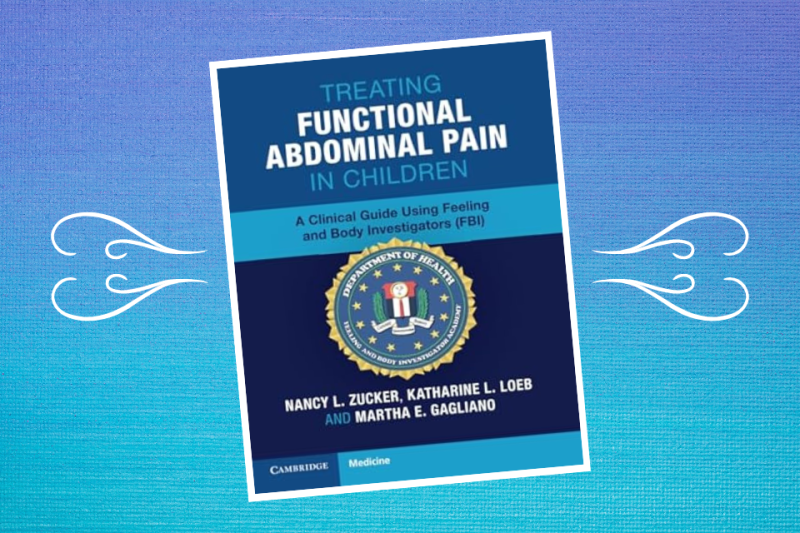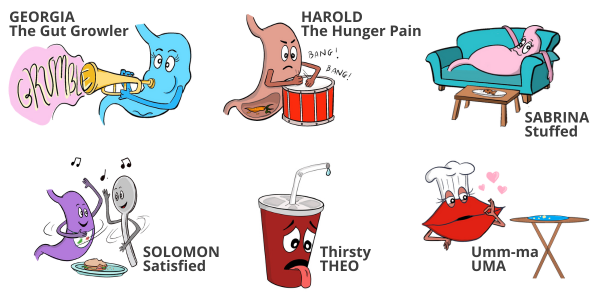
In a novel intervention developed by Nancy Zucker, PhD, children with functional abdominal pain are introduced to a fun and relatable cast of characters, including Georgia the Gut Growler, Harold the Hunger Pain, and Thirsty Theo, to name just a few. Through these characters, kids are trained to become “Feeling and Body Investigators” (FBI) who listen carefully to their bodies to learn why their belly might be hurting and how to manage their symptoms.
Children with pain often have a fear response when experiencing pain, Zucker explained, so she developed the characters to “try to make their body sensations not only less scary, but also funny and silly. It’s a deliberate intervention strategy to alter that initial perception from fear to curiosity and acceptance—like, ‘Oh, that’s just Gassy Gus.’”
Zucker, a professor of psychiatry and behavioral sciences at Duke, recently published a practical handbook, “Treating Functional Abdominal Pain in Children,” to guide clinicians on delivering this treatment protocol, which was developed and tested with funding from the National institute of Mental Health.
To translate the protocol into an engaging, user-friendly book, she partnered with colleagues and co-authors Katharine Loeb, PhD, eating disorders expert and director of research and training at the Chicago Center for Evidence-Based Treatment, and retired Duke pediatrician Marty Gagliano, MD, a physician with 40 years of experience and leader in the Primary Care Research Consortium at Duke. Zucker’s former undergraduate research assistant, Lizbeth Leapo, illustrated the characters in the protocol.
“It’s a deliberate intervention strategy to alter that initial perception from fear to curiosity and acceptance—like, ‘Oh, that’s just Gassy Gus.’”
— Nancy Zucker, PhD

Functional Abdominal Pain 101
Functional abdominal pain is a stress-related disorder involving a complex interaction between one’s brain and gut. The condition causes frequent stomach aches that impair one’s ability to carry out typical activities such as—for children—engaging in school and participating in sports. It affects about 10 percent of children.
Effective treatment for functional abdominal pain must focus not only on physical symptoms, but also on the impact of environmental and psychological factors on the child’s symptoms.
“Pain at an early age is a marker for later pain and psychopathology,” Zucker noted. “The intervention was designed with this in mind, so the kids learn about their emotional experience and the regulation and integration of emotions, with the hope that developing this set of tools early in their lives may help head off later disorders.”
Becoming Feeling and Body Investigators

The premise of the FBI intervention is “to teach kids that their bodies are wicked smart, with the capacity to give them really important messages that they need to listen and respond to,” Zucker said.
In each session, children—typically ages 4 to 10—and their parents learn about different body sensations related to a theme and meet the characters associated with those sensations. In the “Eats” module, for example, they learn about the body sensations of hunger (Harold the Hunger Pain), fullness (Solomon Satisfied), thirst (Thirsty Theo), and food deliciousness (Umm-ma Uma). Then, the children engage in interactive exercises designed as investigations to provoke and reflect on different body sensations.
The intervention, which can be delivered in a group or individual format, empowers children to deeply connect with their bodies and make informed decisions about how to respond to what they’re feeling.
A parent of one FBI participant shared, “She is certainly better—incredibly better—at [identifying] what the physical pain is, versus a generic ‘my tummy hurts’ … so if she’s worried about something or she’s nervous about something, she can say ‘my tummy hurts because I’m nervous’ ….”
Minding the Pain
In addition to the characters and investigation-based activities, another unique aspect of the treatment is that, unlike other many other pain interventions in which taking one’s mind off the pain is the primary focus, FBI prompts children to pay attention to their pain—but in a particular way.
“We’re manipulating the quality of attention so that it’s based in curiosity. We’re trying to steer kids away from catastrophizing their pain and help them make more realistic appraisals of their pain so it’s less scary.”
— Nancy Zucker, PhD
“We’re manipulating the quality of attention so that it’s based in curiosity,” Zucker explained. “It shares some aspects with cognitive behavioral therapy approaches for functional abdominal pain in older children. We’re trying to steer kids away from catastrophizing their pain and help them make more realistic appraisals of their pain so it’s less scary.”
An A-Ha Moment
Zucker, an eating disorders expert who works primarily with children, believes psychological interventions should be fun. She recalls an affirming moment early in the trials of the FBI intervention when she realized just how much her young patients were enjoying their sessions.
During the “Henry Heartbeat” investigation in the Zoomies and Shakies module, children are shown how to find and count their heartbeat and do different activities that raise and lower their heartbeat. “I remember a little girl, about six or seven years old, feeling so delighted that her body was ‘talking back to her’ and that she could do things that would make her body respond in certain ways,” she reflected. “She just started dancing around. She was so joyful about this ability to be connected to her body.”
There’s a Manual for That
According to Zucker, functional abdominal pain is one of the most frequent presenting complaints to pediatricians. With this new book, pediatricians and other clinicians who work with children will have everything they need to implement FBI, enabling broader access to the intervention for children who struggle with the condition and their parents. The manual provides a step-by-step guide to treatment, including session plans, activities, downloadable materials, and more.
Learn More
Read the research behind the “Feeling and Body Investigators” intervention:
- The Diagnosis of Avoidant Restrictive Food Intake Disorder in the Presence of Gastrointestinal Disorders: Opportunities to Define Shared Mechanisms of Symptom Expression (2021)
- Children’s Beliefs about Pain: An Exploratory Analysis (2021)
- Feeling and Body investigators (FBI): ARFID Division - An Acceptance-Based Interoceptive Exposure Treatment for Children with ARFID (2019)
- Acceptance-Based Interoceptive Exposure for Young Children with Functional Abdominal Pain (2017)
Purchase the book: Cambridge University Press | Amazon